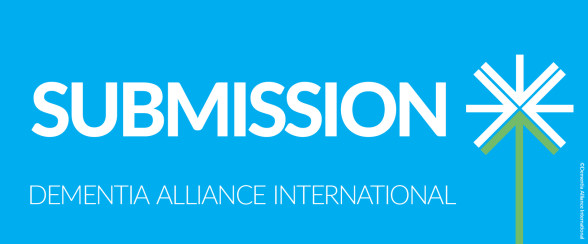On 31 January 2023, DAI provided a submission to the Australian Department of Health and Aged Care Consultation on the National Dementia Action Plan.
Notably, for this submission, Dementia Alliance International is the only registered charity representing people diagnosed with any type or cause of dementia, of any age, in Australia (and globally).
This means DAI is also a Disability Persons Organization (DPO), as it is the only one in the world exclusively representing people with disabilities due to dementia. We are people with the same human rights and disability rights to all others including access to the Convention on the Rights of Persons with Disabilities (CRPD) and the Optional Protocol to the Convention Against Torture (OPCAT).
DAI is the only independent voice of people diagnosed with any type of dementia in Australia, and globally.
This submission seeks the inclusion of the following 13 recommendations:
1. Dementia is defined as a condition causing multiple disabilities, including cognitive disabilities, and people with dementia are part of the Australian and global neurodiverse community.
2. Employment Rights, including access to the Disability Discrimination Act.
3. Human Rights.
4. Disability Rights including access to the CRPD [this therefore includes access to rehabilitation and enablement].
5. Deinstitutionalisation and desegregation for all people with dementia, as recommended by the United Nations Deinstitutionalization Guidelines are included in your recommendations. Multiple formal enquires and the Royal Commission into Quality and Safety in Aged Care has proven the institutionalisation of older people and people with dementia causes harm and abuse. Residential Aged Care is also coercive, due to the lack of alternative and accessible, dementia-enabling options, and the lack of appropriate environmental design which to enables community living allows people to stay at home for longer.
6. Governments to provide improved access to independent supported decision making, including mandatory training and accountability for substitute decision makers, which is auditable, transparent, and outside of the ambit of current guardianship arrangements (to ensure that guardians or substitute decision makers do not block access due to real or perceived conflicts of interest). Furthermore, a pathway should be developed for people living with dementia to make an Advance Social Directive, whereby they have a voice into the future, should capacity become compromised, particularly in relation to living and social arrangements, visitors and family of choice relationships and including sexual activity.
7. All disability workers must be educated in disability care and support specific to the disabilities caused by dementia, and disability rights, to ensure people with dementia in their care are provided with appropriate care and support. This includes, if a worker is supporting someone with dementia, adequate education about dementia, and the disabilities the different types of dementia can cause.
8. Disability workers and organisations providing disability services and supports through the National Disability Insurance Scheme (NDIS) to people with young onset dementia must be educated in all forms of dementia. This should include, at a minimum, the freely available University of Tasmania Wicking Institute 9-week ‘Understanding Dementia' Massive Open Online Course (MOOC), or an alternative free course in dementia.
9. Dementia education must be provided and must include dementia as a condition causing acquired disabilities, with appropriate training on supporting cognitive and other disabilities specific to the many types or causes of dementia.
10. The introduction of individual and collective actions for people with dementia who experience violence, abuse and neglect in any setting, and including care partners and family members who are impacted by that harm.
a) This must be at all levels to improve the recognition of, and prevention of all forms of violence, abuse and neglect in residential aged care, respite, and community.
b) Governments will introduce improved reporting of violence, abuse and neglect in residential aged care, respite and community care, and for perpetrators of harm to be held accountable.
c) Governments will introduce improved complaint processes victims/survivors support schemes, and specialised services for older people and people with dementia who have experienced any form of violence, abuse or neglect, including or who are at risk of experiencing sexual assault, and
d) Individual and collective reparations that are accessible and affordable for people with dementia and older people who experience any form of harm, and others who are impacted by that harm such as care partners and family members.
11. We recommend other strategies are developed, and that the Dementia Friendly Communities and other Dementia Friendly Initiatives are not the only or strategies being targeted and funded for awareness raising, or to reduce stigma and discrimination.
12. We also note people with dementia and dementia specific organisations such as DAI have not been involved in the reforms to the NDIS or the NDIS review, Government needs to fund a DPO of people with dementia as part of the funded DPO’s National Disability Representative Organisations in the Department of Social Services. In the absence of an Australian based DPO, DAI should be included.
13. Finally, we recommend that all people with disabilities due to dementia have access to the NDIS, as it currently discriminates against people with dementia the age of 65 and older. This is especially significant, due to the time to get a diagnosis often being delayed and prolonged, due to multiple factors, including the pervasive and harmful stigma, and a lack of education of medical and other health care professionals about dementia.
DAI believes it is critical that people with dementia with an authentic voice are central to processes that inform best practice decision-making on what all Australian Governments and others can do to ensure adequate health and social care is provided, in such a way that no human rights are being violated.
We therefore asked the Australian government to take our submission and recommendations seriously, to ensure that people with dementia are not leave behind in the Sustainable Development Goals
Read the full submission here
REMINDERS:
Register for the DAI 9th Birthday Cafe
Have your say: complete the DAI Survey
Support people living with dementia by donating to or partnering with DAI today
